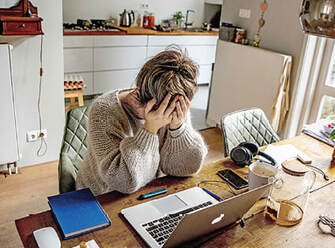After Covid, the psychosocial pandemic
“Vaccines will contain Covid, but not its consequences. After the virus comes another pandemic, that of psychic and social disorders, uncertainties, imbalances... The American public authorities must act now toward disadvantaged minorities, with prevention plans and comprehensive assistance. A group whose livelihood is threatened without a solution will fall prey to fear and despair. It will be a source of uncontrollable and unpredictable social and personal conflicts. And in the USA there are many vulnerable and large ethnic minorities.”From her home in Europe, the German psychologist Eva Katharina Herber, one of the best psychologists in the world, speaks via videoconference with Sol de Medianoche to sound the alarm and extends her warning to other countries.
Eva Katharina Herber is a certified coach in the USA and Canada; a specialist in Applied Positive Psychology in the UK; a psychologist accredited by the European Society of Psychology; a double graduate in International Business Studies and Economics from ESB Reutlingen, Germany, and ICADE, Spain, within the Association of Business Schools IPBS Program. First warning: insomnia “This war [against Covid] has not ended with vaccines,” she insists, “because it opens up the psychosocial front. We must pay attention to the underprivileged classes. If they cannot overcome the crisis caused by the pandemic, neither can society as a whole.” Herber refers to several Canadian studies carried out last year, during the first wave of the pandemic, in which 190,000 clinical cases were studied at the international level, including the US and Canada, in order to discuss the indirect impact of Covid on the world’s population. The first conclusion of these investigations revealed that insomnia was the main side effect in the population of all countries. “It was the warning of what’s coming: after Covid, the psychosocial pandemic,” says Herber, “since insomnia is the first reaction of the human mind when unable to process things emotionally. The coronavirus and its successive waves (we’ve had four in the world) represent a traumatic situation. 22% of the population in all the countries in the study showed symptoms of post-traumatic stress and hypersensitivity to emotions (one in five); 16% suffer from depression (one in six) and 15% from anxiety (one in six).” Emotional exhaustion “After the first reaction of not being able to process the pandemic, comes this psychological impact. The human mind can’t take it anymore; it collapses. We suffer an acute and prolonged effect. There is emotional exhaustion. Last year, there was a lot of social awareness of active confrontation toward Covid. But in 2021 this awareness has been lost.” The economic and labor effects will be, according to Herber, “less productivity; fewer positive feelings and motivation in companies and work teams; feeling of loss of citizen freedoms and emotional, psychological and social imbalance, which will be evidenced in fear, uncertainty and economic instability and insecurity at work. These imbalances will be increasingly stronger in the long term, after a prolonged period of negativity and little or no social positivity.” Reflection in social networks Eva Katharina Herber also refers to the Internet as the source of the “constant bombardment of negative information. Social networks accelerate and accentuate the negative psychosocial effects. They have multiplied the use of words such as anxiety, unemployment and suicide, problems that we keep turning over in our heads.” “Suicide is a consequence of despair, a feeling of defeat and helplessness. Human beings do not have a self-destructive instinct and if a group sees its subsistence and status endangered, it can fall into social phobia. Each culture and each ethnic group has its own idiosyncrasies. But if social minorities feel even more disadvantaged than they already are, governments and society have to do something to bring wellbeing to these vulnerable sectors of the population, because their benefit will be a benefit for all.” |
